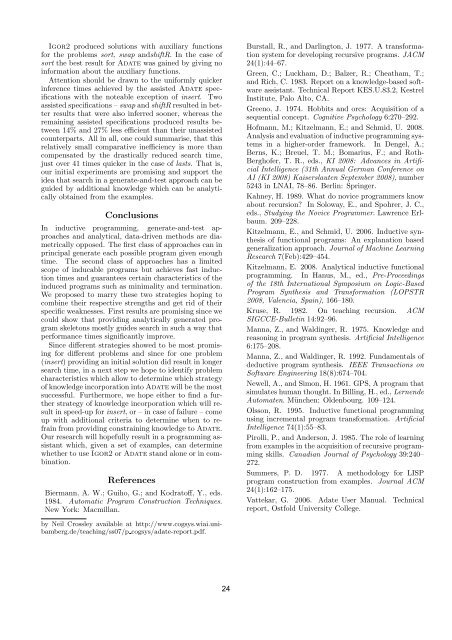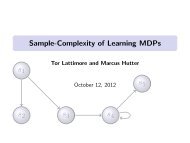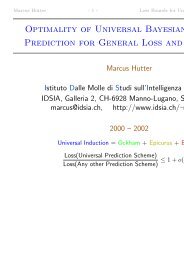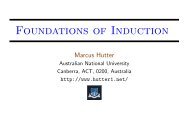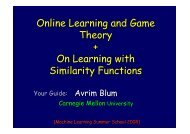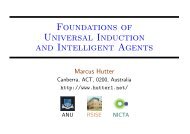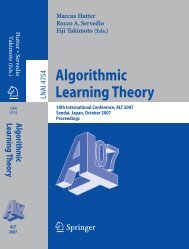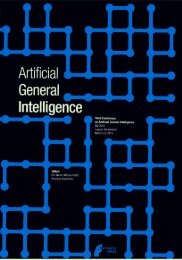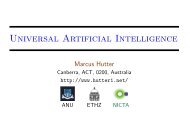A Framework for Evaluating Early-Stage Human - of Marcus Hutter
A Framework for Evaluating Early-Stage Human - of Marcus Hutter
A Framework for Evaluating Early-Stage Human - of Marcus Hutter
You also want an ePaper? Increase the reach of your titles
YUMPU automatically turns print PDFs into web optimized ePapers that Google loves.
Igor2 produced solutions with auxiliary functions<br />
<strong>for</strong> the problems sort, swap andshiftR. In the case <strong>of</strong><br />
sort the best result <strong>for</strong> Adate was gained by giving no<br />
in<strong>for</strong>mation about the auxiliary functions.<br />
Attention should be drawn to the uni<strong>for</strong>mly quicker<br />
inference times achieved by the assisted Adate specifications<br />
with the noteable exception <strong>of</strong> insert. Two<br />
assisted specifications – swap and shiftR resulted in better<br />
results that were also inferred sooner, whereas the<br />
remaining assisted specifications produced results between<br />
14% and 27% less efficient than their unassisted<br />
counterparts. All in all, one could summarise, that this<br />
relatively small comparative inefficiency is more than<br />
compensated by the drastically reduced search time,<br />
just over 41 times quicker in the case <strong>of</strong> lasts. That is,<br />
our initial experiments are promising and support the<br />
idea that search in a generate-and-test approach can be<br />
guided by additional knowledge which can be analytically<br />
obtained from the examples.<br />
Conclusions<br />
In inductive programming, generate-and-test approaches<br />
and analytical, data-driven methods are diametrically<br />
opposed. The first class <strong>of</strong> approaches can in<br />
principal generate each possible program given enough<br />
time. The second class <strong>of</strong> approaches has a limited<br />
scope <strong>of</strong> inducable programs but achieves fast induction<br />
times and guarantees certain characteristics <strong>of</strong> the<br />
induced programs such as minimality and termination.<br />
We proposed to marry these two strategies hoping to<br />
combine their respective strengths and get rid <strong>of</strong> their<br />
specific weaknesses. First results are promising since we<br />
could show that providing analytically generated program<br />
skeletons mostly guides search in such a way that<br />
per<strong>for</strong>mance times significantly improve.<br />
Since different strategies showed to be most promising<br />
<strong>for</strong> different problems and since <strong>for</strong> one problem<br />
(insert) providing an initial solution did result in longer<br />
search time, in a next step we hope to identify problem<br />
characteristics which allow to determine which strategy<br />
<strong>of</strong> knowledge incorporation into Adate will be the most<br />
successful. Furthermore, we hope either to find a further<br />
strategy <strong>of</strong> knowledge incorporation which will result<br />
in speed-up <strong>for</strong> insert, or – in case <strong>of</strong> failure – come<br />
up with additional criteria to determine when to refrain<br />
from providing constraining knowledge to Adate.<br />
Our research will hopefully result in a programming assistant<br />
which, given a set <strong>of</strong> examples, can determine<br />
whether to use Igor2 or Adate stand alone or in combination.<br />
References<br />
Biermann, A. W.; Guiho, G.; and Kodrat<strong>of</strong>f, Y., eds.<br />
1984. Automatic Program Construction Techniques.<br />
New York: Macmillan.<br />
by Neil Crossley available at http://www.cogsys.wiai.unibamberg.de/teaching/ss07/p<br />
cogsys/adate-report.pdf.<br />
24<br />
Burstall, R., and Darlington, J. 1977. A trans<strong>for</strong>mation<br />
system <strong>for</strong> developing recursive programs. JACM<br />
24(1):44–67.<br />
Green, C.; Luckham, D.; Balzer, R.; Cheatham, T.;<br />
and Rich, C. 1983. Report on a knowledge-based s<strong>of</strong>tware<br />
assistant. Technical Report KES.U.83.2, Kestrel<br />
Institute, Palo Alto, CA.<br />
Greeno, J. 1974. Hobbits and orcs: Acquisition <strong>of</strong> a<br />
sequential concept. Cognitive Psychology 6:270–292.<br />
H<strong>of</strong>mann, M.; Kitzelmann, E.; and Schmid, U. 2008.<br />
Analysis and evaluation <strong>of</strong> inductive programming systems<br />
in a higher-order framework. In Dengel, A.;<br />
Berns, K.; Breuel, T. M.; Bomarius, F.; and Roth-<br />
Bergh<strong>of</strong>er, T. R., eds., KI 2008: Advances in Artificial<br />
Intelligence (31th Annual German Conference on<br />
AI (KI 2008) Kaiserslauten September 2008), number<br />
5243 in LNAI, 78–86. Berlin: Springer.<br />
Kahney, H. 1989. What do novice programmers know<br />
about recursion? In Soloway, E., and Spohrer, J. C.,<br />
eds., Studying the Novice Programmer. Lawrence Erlbaum.<br />
209–228.<br />
Kitzelmann, E., and Schmid, U. 2006. Inductive synthesis<br />
<strong>of</strong> functional programs: An explanation based<br />
generalization approach. Journal <strong>of</strong> Machine Learning<br />
Research 7(Feb):429–454.<br />
Kitzelmann, E. 2008. Analytical inductive functional<br />
programming. In Hanus, M., ed., Pre-Proceedings<br />
<strong>of</strong> the 18th International Symposium on Logic-Based<br />
Program Synthesis and Trans<strong>for</strong>mation (LOPSTR<br />
2008, Valencia, Spain), 166–180.<br />
Kruse, R. 1982. On teaching recursion. ACM<br />
SIGCCE-Bulletin 14:92–96.<br />
Manna, Z., and Waldinger, R. 1975. Knowledge and<br />
reasoning in program synthesis. Artificial Intelligence<br />
6:175–208.<br />
Manna, Z., and Waldinger, R. 1992. Fundamentals <strong>of</strong><br />
deductive program synthesis. IEEE Transactions on<br />
S<strong>of</strong>tware Engineering 18(8):674–704.<br />
Newell, A., and Simon, H. 1961. GPS, A program that<br />
simulates human thought. In Billing, H., ed., Lernende<br />
Automaten. München: Oldenbourg. 109–124.<br />
Olsson, R. 1995. Inductive functional programming<br />
using incremental program trans<strong>for</strong>mation. Artificial<br />
Intelligence 74(1):55–83.<br />
Pirolli, P., and Anderson, J. 1985. The role <strong>of</strong> learning<br />
from examples in the acquisition <strong>of</strong> recursive programming<br />
skills. Canadian Journal <strong>of</strong> Psychology 39:240–<br />
272.<br />
Summers, P. D. 1977. A methodology <strong>for</strong> LISP<br />
program construction from examples. Journal ACM<br />
24(1):162–175.<br />
Vattekar, G. 2006. Adate User Manual. Technical<br />
report, Ostfold University College.


